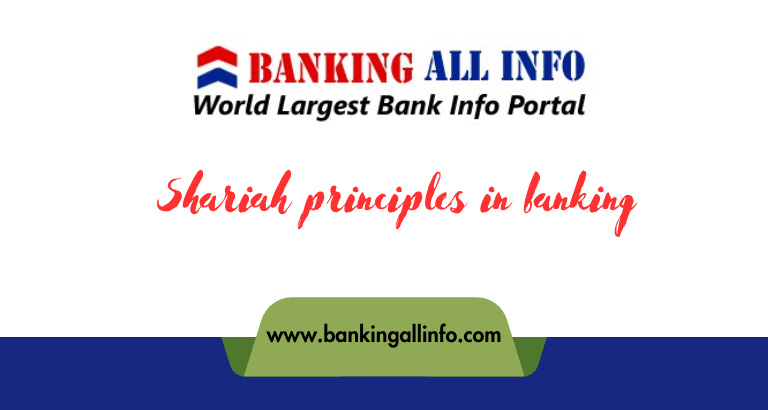Shariah principles in banking
Shariah: The basic principle of the Shariah which serves as guide line in this respects is that if there is more than one provider of capital to a business undertaking, profits can be distributed among them in proportions mutually agreed upon, but losses, if any have to be borne by them strictly in proportion to the capital provided by each party. In most of the earliest theoretical models of Islamic banking, shareholders’ equity and investment deposits were deemed to be the only two remunerable liabilities of an Islamic bank, and holders of investment deposits were treated as one homogenous group.
The profit-sharing arrangements between these two groups of providers of capital were envisaged along the following lines:
- The aggregate profit earned by the bank on the total capital will be divided over it. After such division, the bank will keep an agreed proportion of the profit and the rest will be given to the holders of investment deposits. The proportion of the profit division will determined with the mutual consent of the two parties concerned.
- If the bank suffers a loss, the loss will be shared between the two parties in strict proportion to the capital supplied by each party.
- The maximum incidence of loss to an investment account holder in a loss situation will be limited to the amount of his deposit.
In later contributions to the literature on Islamic banking, it was recognized that profit-sharing arrangements among the remunerable liabilities of an Islamic bank could take more complex forms, while still remaining within Shariah Parameters.
The six types of investment operations approved by the Shari’ah are given below:
- Murabaha(Cost-plus sale)
- Musharaka(Joint venture)
- Mudaraba
- Ijara(Lease)
- Ijara-wa-iktina(Lease- Purchase)
- Qard Hasan(Interest free Loan)
1) Murabaha(Cost-plus sale): A contract in which a client wishing to purchase equipment or goods requests the Islamic Institution to purchase these items at cost and charge the clients cost plus a reasonable profit. These funds are repayable on terms agreed between the parties.
2} Musharaka: ‘Musharaka’ refers to a financing technique adopted by Islamic banks. It is an agreement under which the Islamic bank provides fund, which is mingled with the funds of the business enterprises and others. All providers of the capital are entitled to participate in the management but not necessary required to do so. The profit is distributed among the partners in predetermined ratios, while the loss is borne by each partner in proportion to his contribution.

3} Mudaraba: The term “Mudaraba’’ refers to form of business in which one party brings capital and the other personal effort. The proportionate rate shares in profit determined by mutual agreement. But loss, of any, is borne only by the owner of the capital, in which case the entrepreneur gets nothing for his labor. The financier is known as “rab-al maal” or “Shaeeb –al-maal” and the entrepreneur as “mudarib”.As a financial technique adopted by Islamic banks,it is a contract in which all the capital is provided by the Islamic bank while the business is managed by the other party. The profit shared in pre-agreed ratios, and loss, if any unless caused by negligence or violation of terms of the contract by the “mudarib” is borne by the Islamic bank. The bank passes on this loss to the depositor.
4) Ijara(Lease): Ijara is a contract whereby the investment company purchases an asset and leases it to customer.The lease contract specifies the leasing period, the amount and timing of the lease payments and the responsibilities of the both parties during the life of the lease. Leases may be simple rentals or more elaborate contractual agreements committing the parties to the future actions.
5) Ijara-wa-iktina(Lease- Purchase): The investment company finances equipment, building or an entire project for the client.The customer contractually obliged to purchase such equipment or project, which is made available to him against an agreed rental, together with an undertaking to make payments into an Islamic investment account,which will eventually permit purchase by him of the item financed. The profits accumulating in the investment account are for the benefit of the customer.
6) Qard Hasan(Interest free Loan): Funds advanced for humanitarian and welfare purpose. Repayments are made over a period agreed by both parties with no profit accruing to the financing institution. Qard Hasan at present is limited to private Islamic institutions. However, once the Islamic investment companies have sufficient funds, a small part of their financing can be provided on the basis of Quard Hasan to small entrepreneurs and this will speed up the socio economic development of the country.
What is Shariah in Islam? A Complete Guide to Principles, Importance, and Applications in Islamic Finance
Introduction
Shariah, derived from the Arabic word “Sharīʿah” (شريعة), means “the path to be followed.” It is the divine law of Islam that governs every aspect of a Muslim’s life — spiritual, moral, social, and economic.
In modern times, Shariah has gained special attention in the field of Islamic finance and banking, where it ensures that all financial dealings align with Islamic ethical principles.
This article will explore what Shariah means in Islam, its importance in Islamic finance, core principles, and modern applications in the global economy.
What is Shariah in Islam?
Shariah is a comprehensive system of Islamic law based on the Quran, the Hadith (sayings of Prophet Muhammad ﷺ), Ijma (scholarly consensus), and Qiyas (analogical reasoning).
It provides Muslims with a moral and legal framework for living a righteous life, guiding them in areas such as:
-
Worship and rituals
-
Family and social relations
-
Business transactions
-
Criminal and civil matters
-
Ethical behavior
Shariah is not merely a set of legal codes; it represents the divine will of Allah (SWT) and aims to establish justice, equity, and balance in all aspects of life.
Importance of Shariah in Islamic Finance
Islamic finance operates on the fundamental principle of compliance with Shariah law. This means that all financial activities must:
-
Avoid interest (Riba)
-
Avoid excessive uncertainty (Gharar)
-
Avoid gambling (Maisir)
-
Be based on legitimate trade and profit-sharing
The purpose of Shariah in finance is not just to prohibit unethical practices, but to promote social justice and equitable wealth distribution.
Key Roles of Shariah in Islamic Finance:
-
Ensures ethical conduct: Every transaction must be transparent and fair.
-
Promotes risk-sharing: Both parties share profit and loss.
-
Encourages real economic activity: Investments must be backed by tangible assets.
-
Prevents exploitation: It eliminates interest-based lending and unfair advantages.
In short, Shariah-compliant finance contributes to a more stable and moral financial system.
⚖️ Shariah Law Principles Explained
The principles of Shariah law are built around the objectives of Maqasid al-Shariah, which seek to protect five essential values:
-
Religion (Deen)
-
Life (Nafs)
-
Intellect (Aql)
-
Progeny (Nasl)
-
Wealth (Maal)
These objectives form the basis of every Islamic legal ruling, ensuring that human welfare is always prioritized.
Core Financial Principles under Shariah:
-
Prohibition of Riba (Interest): Any guaranteed profit without risk or effort is forbidden.
-
Prohibition of Gharar (Uncertainty): Contracts must be clear, without hidden terms.
-
Prohibition of Maisir (Gambling): Earning money by chance or speculation is not allowed.
-
Asset-backed Transactions: Every deal should involve real goods or services.
-
Profit and Loss Sharing: Investors and entrepreneurs share outcomes fairly.
These principles ensure that all Islamic financial operations align with divine justice and social responsibility.
Shariah Compliance in Financial Institutions
To maintain the integrity of Islamic finance, Shariah compliance is essential in all institutions — from Islamic banks to investment firms.
What is Shariah Compliance?
It refers to ensuring that all financial products, contracts, and transactions adhere to Islamic law.
⚙️ How It Works:
-
Shariah Supervisory Board (SSB):
A group of qualified Islamic scholars oversees operations and ensures all activities follow Shariah principles. -
Internal Shariah Review:
Financial institutions regularly audit their processes to confirm compliance. -
Shariah Auditing & Reporting:
Annual Shariah compliance reports are published to build customer trust. -
Product Screening:
Every product (such as Sukuk, Takaful, or Mudarabah) is reviewed for compliance before launch.
By following these mechanisms, Islamic financial institutions maintain transparency and integrity in line with Islamic teachings.
The Role of Shariah in Islamic Banking
Islamic banking is the practical implementation of Shariah in the financial world.
Unlike conventional banks, Islamic banks do not charge or pay interest. Instead, they rely on profit-sharing, leasing, and partnership models.
Key Shariah-Based Banking Contracts:
-
Murabaha (Cost-Plus Financing): Bank buys an asset and sells it to the client at a profit margin.
-
Mudarabah (Profit-Sharing): One party provides capital; the other provides expertise.
-
Musharakah (Joint Venture): Both partners contribute capital and share profit/loss.
-
Ijara (Leasing): Bank leases assets to clients for a fixed rental fee.
-
Sukuk (Islamic Bonds): Asset-backed securities that yield returns without interest.
These contracts embody the essence of Shariah — fairness, transparency, and risk-sharing.
Shariah Governance Framework
A Shariah governance framework is a structured system that ensures consistent implementation of Islamic principles across financial institutions.
Components of Shariah Governance:
-
Shariah Supervisory Board (SSB) – Provides rulings and guidance.
-
Management Oversight – Ensures operations follow SSB decisions.
-
Internal Shariah Compliance Unit – Monitors ongoing activities.
-
Shariah Audit Function – Independently verifies compliance.
-
Regulatory Authorities – Establish national or regional Shariah frameworks.
Countries like Malaysia, Bahrain, and the UAE have developed strong Shariah governance models that ensure global confidence in their Islamic financial systems.
Benefits of Shariah-Compliant Investment
Shariah-compliant investments are not only religiously permissible but also ethically sound and socially responsible.
✨ Key Benefits:
-
Ethical Integrity: Avoids industries like alcohol, gambling, and weapons.
-
Stability: Asset-backed investments are less prone to financial bubbles.
-
Transparency: Contracts and risks are clearly defined.
-
Shared Prosperity: Encourages equitable wealth distribution.
-
Global Acceptance: Growing investor demand for ethical and halal investments.
In fact, Shariah-compliant funds are gaining traction even among non-Muslim investors who value sustainability and ethics.
Shariah and Ethical Finance
The foundation of Shariah is ethics and morality.
Islamic finance and ethical finance share many common goals — such as justice, social welfare, and environmental responsibility.
Shared Principles:
-
No exploitation or harm
-
Fair trade practices
-
Sustainable investments
-
Transparency and honesty
-
Protection of stakeholders’ rights
Hence, Shariah-based finance can be seen as an early form of modern ethical finance, aligning profitability with moral responsibility.
Shariah Interpretation and Implementation
The interpretation (Ijtihad) of Shariah allows scholars to apply Islamic principles to new, evolving contexts.
Steps in Shariah Interpretation:
-
Refer to Primary Sources: The Quran and Hadith.
-
Use of Ijma and Qiyas: Consensus and analogical reasoning for new cases.
-
Modern Application: Scholars interpret rulings to fit today’s economic systems.
This flexibility ensures that Shariah remains timeless, applicable across generations and cultures while maintaining its spiritual essence.
Modern Applications of Shariah
Shariah is not limited to ancient jurisprudence — it’s a living system that continues to guide modern society.
Contemporary Fields Influenced by Shariah:
-
Islamic Banking & Finance – Interest-free, ethical banking systems.
-
Takaful (Islamic Insurance) – Cooperative risk-sharing insurance model.
-
Sukuk (Islamic Bonds) – Asset-backed financial instruments.
-
Halal Industry – Food, cosmetics, pharmaceuticals adhering to Islamic standards.
-
Digital Shariah Compliance – Fintech solutions that automate halal financial transactions.
With growing demand for ethical, sustainable, and responsible finance, Shariah’s relevance continues to expand globally — even beyond Muslim-majority nations.
Conclusion
Shariah represents the divine guidance that leads Muslims toward justice, balance, and righteousness in all areas of life — from worship to economics.
In the financial world, Shariah-compliant systems offer a just and transparent alternative to interest-based capitalism.
Through its core values of ethics, fairness, and social welfare, Shariah ensures that finance serves humanity — not the other way around.
As global awareness grows, the integration of Shariah and ethical finance could pave the way for a more stable, inclusive, and morally conscious financial future.

